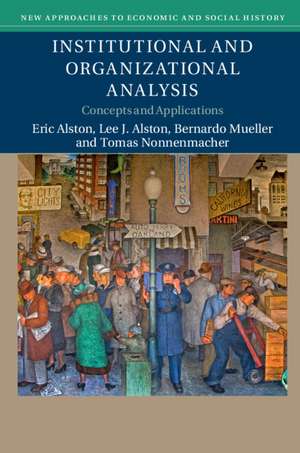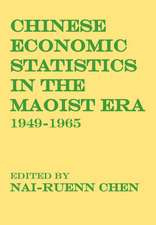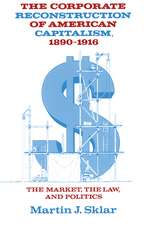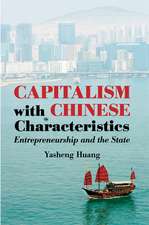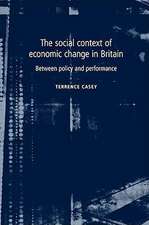Institutional and Organizational Analysis: Concepts and Applications: New Approaches to Economic and Social History
Autor Eric Alston, Lee J. Alston, Bernardo Mueller, Tomas Nonnenmacheren Limba Engleză Hardback – 22 aug 2018
| Toate formatele și edițiile | Preț | Express |
|---|---|---|
| Paperback (1) | 305.88 lei 38-44 zile | |
| Cambridge University Press – 22 aug 2018 | 305.88 lei 38-44 zile | |
| Hardback (1) | 659.61 lei 17-23 zile | +64.93 lei 4-10 zile |
| Cambridge University Press – 22 aug 2018 | 659.61 lei 17-23 zile | +64.93 lei 4-10 zile |
Preț: 659.61 lei
Preț vechi: 856.64 lei
-23% Nou
Puncte Express: 989
Preț estimativ în valută:
126.26€ • 137.19$ • 106.12£
126.26€ • 137.19$ • 106.12£
Carte disponibilă
Livrare economică 27 martie-02 aprilie
Livrare express 14-20 martie pentru 74.92 lei
Preluare comenzi: 021 569.72.76
Specificații
ISBN-13: 9781107086371
ISBN-10: 110708637X
Pagini: 406
Ilustrații: 19 b/w illus.
Dimensiuni: 157 x 235 x 26 mm
Greutate: 0.67 kg
Editura: Cambridge University Press
Colecția Cambridge University Press
Seria New Approaches to Economic and Social History
Locul publicării:New York, United States
ISBN-10: 110708637X
Pagini: 406
Ilustrații: 19 b/w illus.
Dimensiuni: 157 x 235 x 26 mm
Greutate: 0.67 kg
Editura: Cambridge University Press
Colecția Cambridge University Press
Seria New Approaches to Economic and Social History
Locul publicării:New York, United States
Cuprins
Introduction; Part I. From Institutions to Economic Outcomes: 1. Institutions and property rights; 2. Property rights and transaction costs; 3. Organizations and contracts; Part II. From Economic Outcomes to Political Performance: 4. Special interests and citizens; 5. The legislature and executive; 6. Bureaucracies; 7. The judicial system; Part III. The Dynamics of Economic and Political Development: 8. Developmental trajectories: institutional deepening and critical transitions; 9. Case studies of critical transitions: Argentina, Brazil, Ecuador, and the United States; Conclusion.
Recenzii
'These four intrepid authors develop a theory of institutional and organizational analysis of enormous ambition. Influenced by Buchanan, Coase, North and Ostrom, and Williamson, they work on a broad tapestry that crosses continents, spans centuries, and yet always maintains its focus on which set of arrangements flourish and which flounder.' Richard A. Epstein, New York University, The Hoover Institution and University of Chicago
'As a rule you can only synthesize an academic field when it is moribund. This book is the exception that proves the rule; it manages to bring together the most important ideas in institutional economics in a way which not only shows how intellectually vibrant it is, but which also opens up new research agendas. There is no better introduction.' James A. Robinson, University of Chicago
'This comprehensive introduction to the study of institutions and organizations approaches the question I have long considered in my own work: which set of institutions are most conducive to economic development? These authors provide an excellent synthesis of this essential field of study for students and scholars alike.' Hernando de Soto, Institute for Liberty and Democracy
'This is the book we've been waiting for - a comprehensive, comparative, interdisciplinary tour of the key concepts and most significant arguments that define modern political economy. The authors have assembled a remarkable volume of scope and content. It belongs on every scholar's shelf and in every student's hands.' Kenneth A. Shepsle, Harvard University
'This is a wonderful book - broad in scope (institutions, norms, organizations, and contracts), in disciplines (economics, political science, law, and history), and in methodologies (classic informal arguments, summaries of recent formal models, and incisive case studies). So many problems of collective action, productivity, development, and growth find almost no expression (not to mention solution) in neoclassical analyses of markets; Institutional and Organizational Analysis offers a way forward.' Robert Gibbons, Sloan School of Management, Massachusetts Institute of Technology
'As a rule you can only synthesize an academic field when it is moribund. This book is the exception that proves the rule; it manages to bring together the most important ideas in institutional economics in a way which not only shows how intellectually vibrant it is, but which also opens up new research agendas. There is no better introduction.' James A. Robinson, University of Chicago
'This comprehensive introduction to the study of institutions and organizations approaches the question I have long considered in my own work: which set of institutions are most conducive to economic development? These authors provide an excellent synthesis of this essential field of study for students and scholars alike.' Hernando de Soto, Institute for Liberty and Democracy
'This is the book we've been waiting for - a comprehensive, comparative, interdisciplinary tour of the key concepts and most significant arguments that define modern political economy. The authors have assembled a remarkable volume of scope and content. It belongs on every scholar's shelf and in every student's hands.' Kenneth A. Shepsle, Harvard University
'This is a wonderful book - broad in scope (institutions, norms, organizations, and contracts), in disciplines (economics, political science, law, and history), and in methodologies (classic informal arguments, summaries of recent formal models, and incisive case studies). So many problems of collective action, productivity, development, and growth find almost no expression (not to mention solution) in neoclassical analyses of markets; Institutional and Organizational Analysis offers a way forward.' Robert Gibbons, Sloan School of Management, Massachusetts Institute of Technology
Notă biografică
Descriere
Why isn't the whole world developed? This toolkit for institutional analysis explains how rules affect the performance of countries, firms, and even families.
